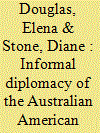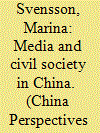| Srl | Item |
| 1 |
ID:
138158


|
|
|
|
|
| Summary/Abstract |
After 20 years, the Australian American Leadership Dialogue has acquired enviable access to political leaders in the foreign policy establishments of both countries. The influence of the Dialogue is at earlier consensus-building stages of decision making. Its importance has been in ‘relationship maintenance’ of the bilateral alliance which it has pursued through processes of informal diplomacy. The Dialogue now faces its own challenges of organisational renewal and relevance in the wider ‘interpretative community’ of Australian think tanks, university policy institutes and opinion-formers.
|
|
|
|
|
|
|
|
|
|
|
|
|
|
|
|
| 2 |
ID:
118675


|
|
|
|
|
| Publication |
2012.
|
| Summary/Abstract |
Although Chinese journalists are not able to create their own independent organisations, they are engaging in informal networking on-line and off-line that has created a strong sense of community among investigative journalists in particular. Through sharing experiences, stories, and struggles, journalists create a collective identity and define their roles in society. Earlier studies of Chinese journalists haven't explicitly addressed the issue of how a journalistic community is created and sustained in a society that lacks freedom of the press and where freedom of association is severely restricted, and the importance of new information and communication technologies (ICTs) in this context, which is the focus of this article. Furthermore, it is important to study the extent to which and how investigative journalists network with other groups in society, including lawyers, public intellectuals, and civil society organisations. With the development of micro-blogging (weibo) we see new forms of community building, more open expressions of solidarity and ironic resistance, as well as increasing levels of interactivity between different groups in society. By reporting on injustices and the situation of marginalized groups in society, and commenting on public events on weibo, investigative journalists interact with many different groups in society and become part of a larger community of people who share the same ideals and struggles. Some journalists go one step further and set up or become actively involved in charity work and civil society organisations.
|
|
|
|
|
|
|
|
|
|
|
|
|
|
|
|